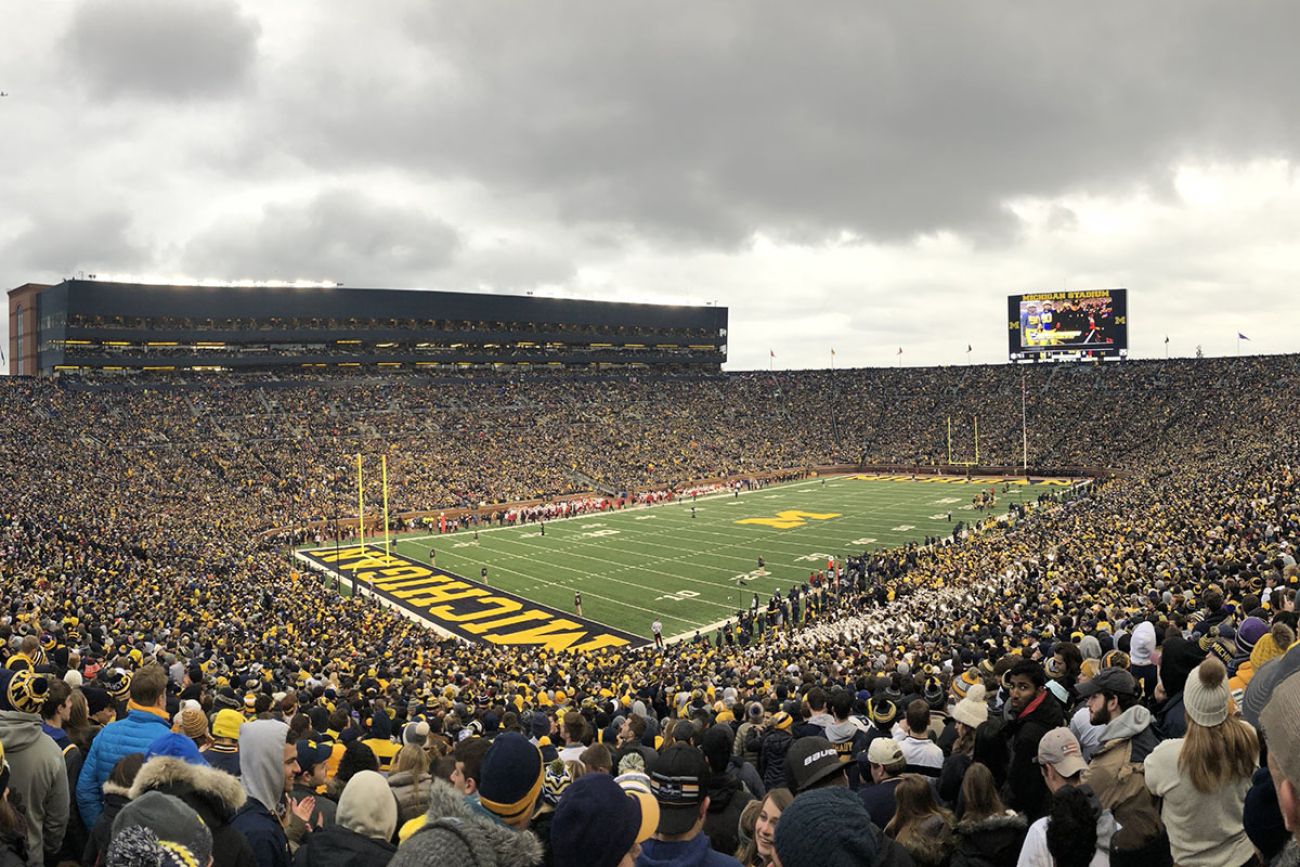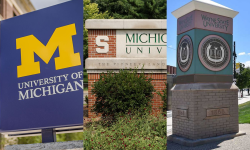Michigan poised to allow beer sales in college stadiums. What research says

- Game-day rowdiness is problem in Michigan college towns, and lawmakers want to expand beer sales
- Proponents say in-stadium sales could reduce drinking to excess at tailgate parties before games
- Bridge reviewed 11 studies on the effect of in-stadium sales; most found they made little difference
When 20 RVs pull into the parking lot across the street from her house, Susan Ward Schmidt knows it is game day in Ann Arbor.
Living a few blocks from the University of Michigan’s “Big House”— a 107,601-seat stadium that is the largest in the United States — the 65-year-old retired teacher has heard it all: music blasting at tailgate parties, cheers from drunk fans and the “obnoxious” parties by alumni who rent houses in her neighborhood.
“You feel your city vibrating,” Schmidt, who also sits on the Ann Arbor Public School Board of Education, told Bridge Michigan.
“The alcohol just fans the flame.”
Related:
- College athletes unionized? This Michigan Democrat wants to make it happen
- Beer o’clock may beckon at Michigan college sports stadiums under new bill
- Fresh bread and vinyl booths: Ann Arbor brunch mainstay Angelo's to close
Schmidt is now worried the drinking in her college town could get worse under a state bill that would allow public universities to serve alcohol at stadiums during college sports events.
Senate Bill 247, sponsored by Sen. Sean McCann, D-Kalamazoo, cleared the Senate this month. The House passed a similar bill on Tuesday with minor revisions, sending the legislation back to the Senate.
The bill would allow Michigan universities to sell alcohol inside stadiums at all college sports events, from an hour before the game until 30 minutes after the game ends. Each university would be allowed to obtain up to five liquor licenses for the events, and only trained servers are allowed to serve alcohol at those events.
If approved, Michigan State University and UM would join 11 other Big Ten Conference schools where in-stadium alcohol sale is already allowed.
McCann and supporters of the legislation have argued the measure would improve fan experience and expand alcohol access from luxury suites to the general public. Allowing access to alcohol inside the stadium could also reduce the risk of fans binge drinking ahead of the game, they contended.
“Patrons, we hope, would be less inclined to load up prior to the game knowing that they will have the option to obtain an alcoholic beverage upon entering the facility and through the duration of the game,” McCann said in a Senate committee hearing on June 13.
“Many states who have implemented similar legislation already have seen reports from universities indicating that the number of alcohol-related incidents declined after this prohibition was lifted.”
Indeed, some universities enjoyed a drop in alcohol-related incidents after allowing in-stadium beer sales. The University of West Virginia reported a 35-percent decrease in police reports during the first four games of 2010 — which the university attributed to alcohol sales and several other policies.
There is no consensus: A Bridge Michigan review of 11 studies showed that most noted little significant difference in incidents with or without alcohol sales, while some researchers say more booze usually creates more problems.
“When you make it easier for people to get alcohol, negative things happen,” said Aaron White, senior scientific adviser to the director at the National Institute on Alcohol Abuse and Alcoholism, a federal government agency under the U.S. Department of Health and Human Services.
Michigan state Rep. Abraham Aiyash, D-Hamtramck, questioned whether lawmakers should “make our fans drunk in the middle of a beautiful sports match that so many of us enjoy here in the great state of Michigan.”
The bill is backed by many public universities, including Michigan State, Western Michigan, Eastern Michigan and Oakland. It also received support from the state’s Liquor Control Commission and trade groups such as the Michigan Licensed Beverage Association and the Michigan Restaurant and Lodging Association.
Rick Fitzgerald, spokesperson for UM, told Bridge last week the university is “watching this matter closely” but did not indicate if the university has taken a position.
While the science is unsettled, the profit potential is far more certain.
In 2019, Texas A&M University made $2.4 million in alcohol revenue after it expanded in-stadium sales to the general public. During the 2022 football season, University of Tennessee saw $3.3 million in alcohol sales revenue — a 25-percent jump from the $2.7 million in 2021, the Knoxville Sentinel reported.
Even though millions of dollars are at stake, that’s chump change to the money generated by big-time college sports: UM’s athletic department brought in more than $210 million — a record high — in fiscal year 2022, USA TODAY reported. The Spartans at MSU hauled in $172 million, according to 247 Sports.
Party schools?
Football and drinking, especially, go hand-and-hand.
“People drink more during game days even if it’s an away game. They drink even more if it’s a home game. If it’s a tough competitor, they drink even more,” said White of the NIAAA.
Michigan State University has a reputation as a party school, with several alcohol-fueled riots after big games in the 2000s. At UM, the school stepped up enforcement on fraternity drinking in 2017 after reports of alcohol abuse and sexual misconduct, the New York Times reported.
As of 2018, college students at MSU and UM were drinking less compared to more than a decade ago, but they still drank at a higher level than the national average, according to a survey that year conducted in 40 universities across the country.
In 2006, 45 percent of students at UM reported binge drinking at least once in the past two weeks. In 2018, the figure dropped to 39 percent, the report shows.
Studies inconclusive
Among the studies reviewed by Bridge, most concluded that allowing in-stadium alcohol sales would not have a significant impact on bad behavior.
“Basically the research suggests that, at best, allowing alcohol sales to adults in the stadiums … is benign,” White of NIAAA told Bridge. “There’s no evidence that I’ve seen to suggest that it has a marked reduction in alcohol-related events.”
Only one of the 11 studies contends in-stadium alcohol sales helped reduce drinking-related arrests and disorderly conducts. It found an 81-percent decrease in disorderly conducts on game days after analyzing more than a decade worth of crime data at 33 schools.
Two other studies found the opposite. A 2018 case study at one college found crime increased once alcohol sales were allowed at the stadium. Another study at the University of Colorado Boulder found that a ban on in-stadium alcohol sales contributed to decreased drinking-related incidents in 1996, although the college eventually opened stadium alcohol sales to the general ticket holders in 2018.
The rest of the studies concluded that the policy has no significant impact on student drinking, alcohol-related emergency calls or emergency room visits or disorderly behaviors.
The lack of consensus among researchers is in part because of how difficult it is to measure the policy impact on drinking behaviors, said Toben Nelson, a professor of public health at the University of Minnesota who has studied alcohol-related policies for more than 25 years.
Some studies rely on police reports, which could vary based on enforcement levels, Nelson said. Others rely on self-reported alcohol consumption data, which could be subject to all kinds of biases, he said.
Experts: More enforcement
If universities want to rein in game day binge-drinking, White said they need to limit the size of tailgating parties, denying alcohol to already intoxicated customers, checking IDs or using breathalyzers at the gate to keep out highly drunken fans, White said.
Some universities, such as the University of West Virginia, restrict fans from leaving the stadium and returning later by showing their ticket stubs.
When asked about MSU’s policies to lower the risk of fans binge-drinking on game day, MSU spokesperson Dan Olsen pointed to the university’s nationally-known “social norms” campaign, which began in 2016.
The campaign features a series of educational programs that “reinforce these messages that Spartans, one, take care of each other but, two, don’t feel compelled to engage in intoxication, to celebrate responsibly,” Olsen said.
Similarly, UM has a “Stay in the Blue” campaign that allows students to download an app, reminds them to keep track of how much they drink and gives them tips on avoiding unhealthy drinking habits.
MSU does not limit how many people can congregate at a tailgate party. In fact, it allowed fans to tailgate earlier on Saturday games in 2022, opening tailgate lots at 7 a.m. for all kick-offs between noon and 4 p.m. and at 11 a.m. for all night games, The State News reported.
Previously, lots were open at 7 a.m. for noon kickoffs, 9 a.m. for afternoon games and 1 p.m. for night games.
Olsen said the change was to prevent traffic congestions and allow fans to park early.
At UM, parking lots open between 6 a.m. and noon, and cars must vacate the lots within two hours after the game, according to the university website.
See what new members are saying about why they donated to Bridge Michigan:
- “In order for this information to be accurate and unbiased it must be underwritten by its readers, not by special interests.” - Larry S.
- “Not many other media sources report on the topics Bridge does.” - Susan B.
- “Your journalism is outstanding and rare these days.” - Mark S.
If you want to ensure the future of nonpartisan, nonprofit Michigan journalism, please become a member today. You, too, will be asked why you donated and maybe we'll feature your quote next time!




